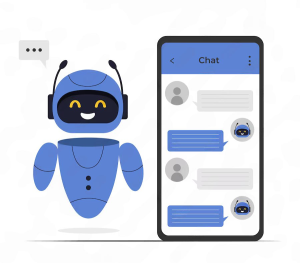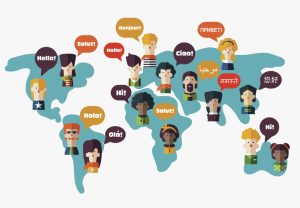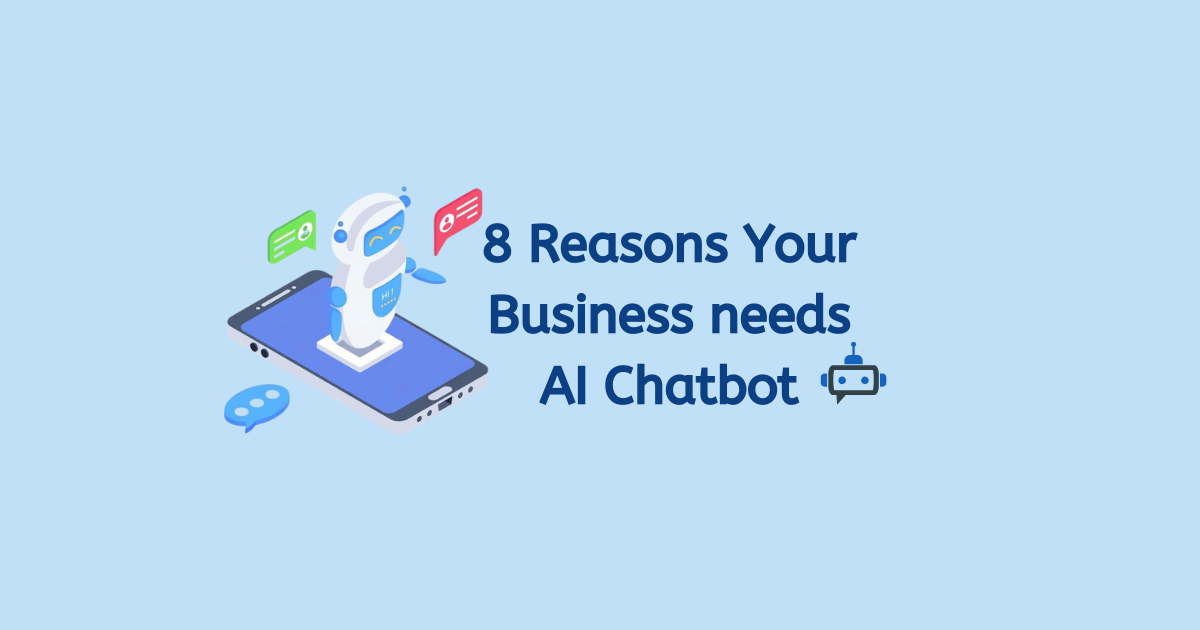In today’s fast-paced business world, firms are constantly looking for ways to improve efficiency and promote growth. Artificial intelligence chatbots have emerged as an effective solution to these problems. Chatbots help organizations deliver faster customer service while also improving operations by automating regular processes and providing instant responses. This not only increases overall efficiency but also allows workers to concentrate on more complex tasks, resulting in improved resource allocation.
The benefits of AI chatbots are obvious: they save organizations time, reduce operating costs, and increase customer satisfaction. These smart tools are revolutionizing customer service by effortlessly handling typical queries, making it more efficient and responsive.
What is AI Chatbot?
An AI chatbot is a software program that uses artificial intelligence (AI) to communicate with users by text or voice. It is a virtual assistant that simulates human-like conversation, automates tasks, and understands and responds to inquiries using Natural Language Processing (NLP). In order to improve user experience, increase operational efficiency, and offer immediate assistance 24/7 , AI chatbots are widely used in customer service, sales, and other sectors.

Challenges faced by businesses for not using AI chatbots
Businesses that do not use AI chatbots face many problems that can reduce efficiency and customer satisfaction. Without AI assistance, operational costs increase because human teams need to track all customer interactions, especially for 24/7 service. Response times are usually slower, which leads to disappointment and dissatisfaction.
Furthermore, the lack of AI chatbots restricts personalized, real-time interactions, which reduces customer engagement and retention. Businesses that lack AI-driven insights risk losing crucial data on customer behaviour and trends.
Also, employees may be stressed with repetitive enquiries, which limits their ability to concentrate on more complex duties.
How AI chatbots help businesses
AI chatbots provide businesses with several significant benefits, making them a vital tool in modern operation
- Improving Customer Engagement: AI chatbots allow businesses to engage customers in real time, answering questions and giving personalized help, resulting in higher satisfaction and loyalty.
- Cost-Effective: AI chatbots help companies save costs by automating repetitive processes, which reduces the need for huge customer service employees. They work 24/7, require less training, and can handle large volumes efficiently.
- Increasing Conversion Rates: Chatbots contribute to increased conversions and revenues by leading customers through the sales process, suggesting products, and providing fast responses.
- Reduced Human Errors: AI chatbots reduce human errors by automating tasks and providing consistent, appropriate results. Their ability to process data and follow specified workflow without exhaustion results in less mistakes.
- Boosting Market Reach: AI chatbots can be connected to multiple types of channels (web, social media, messaging applications), which allow businesses to reach a larger audience and increase their market presence.
Top 8 reasons your business needs an AI chatbot
1. 24/7 Support

AI chatbots provide 24-hour availability, making sure that clients receive assistance at any time and from any location.
- Always available: Unlike human agents, chatbots function around the clock, delivering continuous support across all time zones, which is extremely useful for businesses with a worldwide clientele.
- Quick Query Resolution: Customers can get instant answers to their concerns, such as product details, order updates, or troubleshooting assistance, even after office hours.
- Improved Customer Satisfaction: As chatbots are always available, they reduce waiting times and provide immediate assistance, boosting the overall customer experience.
2. Multilingual Capabilities

AI chatbots can communicate in multiple languages, which makes them necessary for multinational organizations.
- Breaking Language Barriers: AI chatbots enable seamless communication between companies and their clients from various language backgrounds, allowing users of different countries to connect on the same platform.
- Expanding Market Reach: Businesses can expand into new regions without the need to hire multilingual support employees, giving them access to markets that were unexplored.
- Improved Regional Relevance: Chatbots can deliver customized responses based on the user’s location, such as emphasizing region-specific offers, services, ensuring that material is relevant and valuable to local clients.
3. Task Automation
Chatbots perform normal and repetitive processes, which reduces operational workload.
- Answering frequently asked questions: Chatbots provide rapid solutions to popular questions, such as store hours, shipping information, and return policies, while minimizing human participation.
- Processing Transactions: They help manage orders, track shipment, and facilitate payments while assuring accuracy and speed.
- Scheduling Appointments: Chatbots allow customers to arrange appointments or consultations without requiring manual input, easing scheduling operations for businesses.
4. Seamless Integration

AI chatbots seamlessly interact with existing systems, resulting in consistent processes.
- CRM Integration: They coordinate customer interactions with Customer Relationship Management tools to assure all interactions are recorded and available to team members.
- Omnichannel Presence: Chatbots deliver consistent service across all platforms, including websites, social media, and messaging apps such as WhatsApp and Messenger.
- Real-Time Data Updates: They can access data such as product availability, flight schedules, and account information, which improves accuracy and reliability.
5. Lead Qualification
AI chatbots improve the process of identifying and confirming customers.
- Interactive Engagement: AI chatbots interact with potential customers in real time by asking specific questions to learn about their unique requirements and preferences. This enables efficient and customized communication.
- Efficient Data Collection: Chatbots automatically gather key details like contact information, preferences, and budgets, creating lead profiles that enable sales teams to personalize their reach.
- Lead Prioritisation: AI chatbots increase conversion rates and sales performance by prioritizing high-potential prospects based on lead answers.
6. Scalability
AI chatbots are meant to handle a large number of conversations at once while providing high-quality service regardless of demand.
- Handling High volume: AI chatbots handle number of requests seamlessly, especially during peak periods like Black Friday sale and holidays, providing immediate responses and ensuring customer satisfaction.
- Cost-Effective Growth: Chatbots provide cost-effective growth without the need for additional human teams. This allows organizations to meet rising demand while maintaining good service quality.
- Global Accessibility: AI chatbots are available around-the-clock and provide constant assistance across time zones, enabling companies to service clients worldwide at any time without requiring 24-hour staffing.
7. Customisable for Business Needs
AI chatbots can be customized to meet the specific goals, consumers, and operations of every organization.
- Customized Industry Solutions: Chatbots can be customized for specific industries, such as appointment scheduling for healthcare, automating booking for travel, or personalized product recommendations for e-commerce.
- Brand-Consistent Interactions: Businesses can customize chatbots to match their tone, style, and messaging so that all customer interactions are consistent with their brand identity.
- User-Specific Personalisation: They can adjust to specific user profiles, providing personalized suggestions, support, or promotions depending on consumer history or preferences.
8. Code Execution
Here’s how a chatbot with enhanced code execution skills can improve user experiences.
- Dynamic Problem Solving: The chatbot can run code to solve real-world problems, such as completing calculations, creating data visualizations, or conducting simulations based on user inputs. This enables users to receive practical solutions immediately.
- API Integration: By utilizing APIs, the chatbot may interface with external systems, retrieve or modify data, and automate workflows, effectively acting as a bridge across platforms.
- Real-Time Adaptability: By running code, the chatbot adapts to different settings, providing specific outputs based on the user’s needs, such as a financial calculation or a customized recommendation.
How AI Chatbots Work: The Technology Behind Them
AI chatbots use multiple advanced technologies to communicate with customers effectively and naturally. Below is a brief overview of how they work:
- Input Processing: AI chatbots start by taking user input, such as voice or text commands. This input could range from basic questions to complicated instructions.
- Natural Language Understanding (NLU): To ascertain the user’s intent, the chatbot analyzes the input using Natural Language Processing (NLP). In order to understand what the user is requesting, this stage involves examining the language’s structure, context, and meaning.
- Formulation of the Response: The chatbot generates a suitable response after determining the purpose. This may include employing AI models to generate dynamic responses, performing actions (such as scheduling an appointment), or collecting predetermined answers from a knowledge store.
- Response Delivery: Depending on the communication mode, the user receives the prepared response by voice or text. In order to make interactions more engaging and realistic, chatbots frequently imitate conversational vocabulary.
- Learning and Adaptation: Machine learning is used by advanced chatbots to get better over time. They improve their understanding and reactions by examining previous interactions, which makes them more precise and effective.
ROI of AI Chatbots: Measuring Their Business Impact
A key metric that companies use to determine the value of AI chatbots in relation to their cost is their ROI (Return on Investment). AI chatbots are a beneficial investment because they have a positive effect on many aspects of a company.
-
Cost Savings
- Chatbots reduce the need for large customer care team members by handling thousands of requests at once. For instance, employing a chatbot to handle repetitive duties lowers human expenses without compromising quality.
- Chatbots operate 24/7, unlike human agents, providing continuous service without spending extra costs for overtime or night shifts.
-
Improved Customer Experience
- Chatbots reduce waiting times and increase customer satisfaction by responding quickly to customer’s questions.
- Many chatbots use AI to provide customized responses, increasing user engagement and loyalty.
-
Increased Revenue
- By interacting with users, gathering data, and providing timely, appropriate suggestions, chatbots can generate leads.
- Chatbots can upsell and cross-sell by using client data to suggest more goods or services, which raises the average purchase value.
-
Ability to scale
- Chatbots can handle enormous amounts of interactions during peak times, such as sales events or product debuts, without causing delays.
- As company demand rises, chatbots expand seamlessly without the need for extra staff, ensuring service quality at lower costs.
-
Productivity of Workers
- Chatbots automate routine operations like answering FAQs and scheduling, freeing up staff’ time for more important, high-value activities.
- By taking over time-consuming work, chatbots boost productivity, allowing humans to focus on complicated, important duties.
Conclusion
AI chatbots are transforming business processes by providing 24/7 assistance, automating tasks, and delivering customized, efficient interactions. They improve both efficiency and scalability, allowing organizations to remain competitive in an evolving marketplace.
Without AI chatbots, businesses can face higher expenses, slower replies, and missed interaction opportunities. On the other side, integrating AI chatbots increases decision-making, operational efficiency, and satisfaction, resulting in stronger client relationships. As AI advances, investing in chatbots that meet your company’s needs is essential for maintaining competitive edge and achieving long-term success.
FAQ’s
Q1. How do AI chatbots increase the consumer experience?
A- AI chatbots offer real-time responses and personalized recommendations, and they are available 24/7. This decreases waiting times and increases overall satisfaction, resulting in more customer loyalty.
Q2. Can AI chatbots support multiple languages?
A- Yes, many AI chatbots like YourGPT are multilingual, allowing businesses to connect with clients from multiple nations and languages effortlessly.
Q3. Are AI chatbots a cost-effective solution?
A- AI chatbots are highly cost-effective because they automate regular operations, eliminate the need for huge customer support personnel, and run continuously without additional costs.
Q4. How do AI chatbots support employee productivity?
A- AI chatbots help employees to focus on complicated and strategic responsibilities by managing repetitive chores like answering FAQs or booking appointments, thus increasing productivity.
Q5. What are the challenges that organizations face without AI chatbots?
A- Without AI chatbots, organizations may face delayed response times, higher operating expenses, lack of personalized client interactions, and missed opportunities for immediate engagement.


Leave a Reply